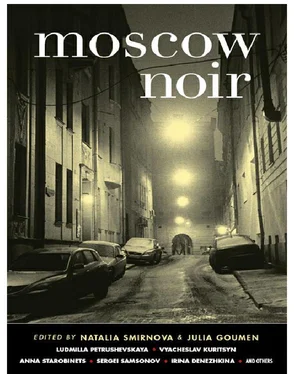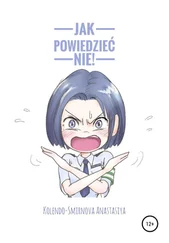Each morning the sheets on my bed were twisted into a hieroglyph suggesting torturous insomnia. The reason: that maniac had acquired the revolting habit of getting up in the middle of the night and shuffling around the room like a somnambulist. My nerves were wound tight as strings, and it was like Tatchuk was pulling a bow across them. I always had the feeling that he was getting up stealthily, tiptoeing toward me. Perhaps with a pillow or razor in hand. I stayed on my guard, waiting for him to strike from behind. I think we both needed help. I found myself having to copy all the files in my computer onto discs that I secured in the desk drawer under lock and key. Things can’t go on like this for long, I told myself. But it didn’t get better. It just went on and on, in the same way.
Once, as I was returning home, I heard him through the door talking to someone on his cell phone. (It must have been his grandma—she was the only living soul willing to listen to his harping.)
“… I filed my claim in court,” he was saying. “He can’t wriggle out of it now. You wouldn’t believe how long it takes them to consider a case! I can’t wait any longer. And guess what? That pitiful wimp managed to land himself a job as a copywriter at a publishing house. He’s making five hundred dollars a month. Oh, and he has a book coming out soon. But I won’t let him feel good about that when my life is such a mess. I want him to live in a state of constant fear. And I’m pretty good at acting insane. I think he’s going to break down and help me soon. My life might be a mess right now, but that’s all the more reason for him to have to suffer as well.”
I went cold with fury. Whether in a healthy state of mind, from hatred toward me, or out of crazy envy of my latest successes, he was like a tick that bit deep into me and wouldn’t let go until it had drunk its fill of my warm blood. They say you can’t teach an old dog new tricks. That may be so, but today Dr. Bessonov is going to have to use a little shock therapy. I’m going to show him something that will make his latest strategy vanish— poof! —into thin air.
Late that evening, when Tatchuk left for the bathroom, I got hold of his inhaler and hid it in the top desk drawer. Then, after hesitating a moment, I locked the drawer and threw the key out the window.
“Sit down, we need to talk,” I said as he came in the door. “It’s time you went home. I’ve had just about enough of you, my friend. So I suggest you gather your things without a big fuss and go back to Novoshakhtinsk. I came clean and told Urusov that I’d been writing for you. The old man told me off a little, but said the papers for your expulsion would be signed in a few days.”
“No, you couldn’t have!” he cried. “I need my education…” Then he underwent a sudden transformation. He drew himself up straight and puffed out like a turkey, as though his sense of dignity had returned and was flooding him from within. He started pacing the room, and I watched him in his agitation. I experienced a cold, predatory curiosity, a sense of my own strength and the ease with which I could simply crush him like a louse.
“Tatchuk,” I warned, “you had your chance.”
He started coughing and turned toward me, jerking spasmodically. His face had gone purple, and his eyes were large and beseeching like a saint on an icon, or a bull in a bullfight. At first he didn’t understand, as he knocked over mugs and glasses on the table, searching one surface and then another, grabbing at things, incredulous at not being able to find his priceless Swiss fix.
“What did you do with it? Did you take it? Give it back right now! Come on, give it to me… Be a man about it… It hurts, it really hurts. It hurts to breathe, I can’t. Seriozha, man, I’m sorry, what do you want? I’m going to die, please. I’m sorry, I’m sorry.” He was wheezing and sputtering, then he coughed out a few more words. He started to lose his balance, took a step toward me, then stumbled. He had to lean on the desk for support, and his hand seemed to go through the wooden tabletop like water.
I continued to sit there, ringing with numbness, as though I were not myself. I behaved with the same sweet aloofness with which a cruel child dissects a bumblebee on the windowsill, probing it’s fuzzy belly with a needle until it spurts white pus like a ripe pimple. I found myself at the point of no return, where love is silent, and it was as pleasant and painful as returning to the cramped unconsciousness of the womb. Suddenly, as though I’d been yanked by the hair, I started at the seriousness of my insult to the world, and I slapped myself on the forehead. What am I doing? I snatched a kitchen knife and rushed to pry open the lock on the flimsy desk drawer. I fumbled for the miserable spray and rushed to my roommate’s side.
“Come on, come on,” I coaxed, “you don’t have to be talented or smart or honest or good. It’s enough to just be alive. Who are we, anyway, to refuse one another the right to exist?”
A day later, his body was found in a toilet stall in the left wing of the building. He was clutching an empty bottle of sleeping pills. By some cruel twist of fate, his body lay prostrate just beneath the words You’re useless , which someone had underlined with a thick marker.
When a person loses someone close to him, it is common that he will feel tortured by a sense of responsibility toward the dearly departed. Friends give speeches in his honor. A bright, whitewashed image of the deceased is created, purified by suffering, which has little to do with the living person you yourself knew. This was exactly the way we, students of the acclaimed professor Urusov who gathered in the courtyard of the dormitory, recalled one who was truly talented, who suffered deeply in crisis—a vulnerable soul whom we ignored, abandoned, and paid no attention to, focused as we were on ourselves. Not that a long time was spent mourning. (It was, after all, the heat of May: sticky leaves rustled in the trees, and the hot air was as thick as the rubber ball we took with us to play soccer at Savelovsky station.) It had already been suggested, as though by chance, that there was no reason to torture ourselves because of someone else’s frivolity and that the fellow himself was to blame. “It was so obviously his own fear of living,” another colleague said.
I stood there trying to find the point from which we could go back to the past, but anger, or envy, or soul-killing apathy had numbed the senses, and, picking us up like chips of wood in a flood, had carried us toward the finish line. I couldn’t find this point, or even picture it. And, more out of a sense of duty, not yet believing in the true, unparalleled reality of a higher judgment, I sidled off furtively, away from the others, mumbling silently under my breath, “God forgive me.”
THE COAT THAT SMELLED LIKE EARTH
by Dmitri Kosyrev (Master Chen)
Birch Grove Park
Translated by Mary C. Gannon
That dude, by the way, he never took his coat off,” the girl told me. “For the first time in my life I did it with a guy in a coat. You know, an old coat, pretty gross.”
A coat in the middle of a hot, stifling Moscow summer? I began to understand my client, the mother of this underage creature. When a girl gives way to her fantasies to such a degree, her friends can deal with it. But not her mother. To the mother, a child will always be a child, even if that child has developed a habit of talking about sex with a definite world-weariness. That’s when I get a phone call that goes, Doctor, can you tell me if a normal person would think something like that?
Читать дальше












